Poetry and the Great War Soldiers: Necessity of Emotion
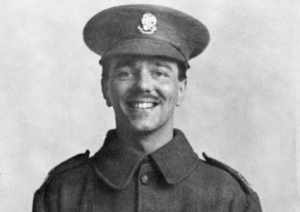
In a letter to his mother early in the war, war poet Wilfred Owen says, “Do you know what would hold me together on a battlefield? The sense that I was perpetuating the language in which Keats and the rest of them wrote!” 1 Though Owen alters his semi-Romantic ideology – that is, his idealization of the natural world and language – as he experiences the horrific fighting of the Great War, his hunger for poetic verse and his desire to interact with language and poetic tradition remains until the end of his life—and can be seen in many of the soldier-poets of World War I or, as it was known in the early 1900s, the Great War. Though Thomas Hardy worries that the art will be lost during the wartime; that “—Poets we read not / Heed not, feed not / Men now need not / What they do,” poetry during wartime boomed and many soldiers wrote it, officers and common soldiers alike. 2 There are multitudes of ways to speak about the war, but poetry is the foremost necessary tool for soldiers to talk both about the realities of the war experience and work through their experienced trauma.
Poetry vs. Photography
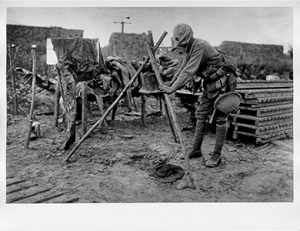
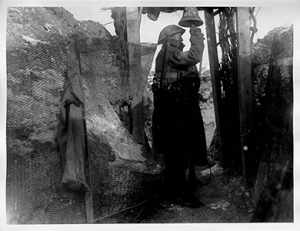
In these two photographs entitled “Chemical Warfare in the Twentieth Century,” gas sentries stand at the ready, their faces obscured. These photographs capture the moment before the grotesque nature of gas warfare—sentries ringing alarms, preparing for battle, competent and ready to go to their probably deaths. The men standing in these photos wear their gas masks, their faces covered and unknowable and there is no sense of the brutality of chemical warfare. Many of the photographs of the Great War follow this vein—showing instances of heroism and vigor instead of the brutality of the Great War.
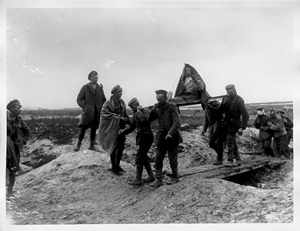
In many of the photographs, the scene is a moment before (such as with the gas sentries ringing their bells) or a moment after—the Battle of Somme, for instance, is represented by a group of at-ready soldiers, their masks firmly in place, standing to attention and ready to engage, and most of the photographs of the trenches are of men lined up and prepared to fight. The photographs cannot give us the reality of the war for several reasons. The most predominant is that they are only able to capture the outside physical moment, disconnecting it from context and the internality of the soldiers involved, but also that many of the photographs do not capture the true heat of battle where most of this brutality was happening—they could only capture the prelude or aftermath. There is a similar problem with video and audio resources—like photographs, they capture moments of rest between battles. There are several videos that show the tragedy of the Great War, such as scenes of the wounded being evacuated, but most of the videos have been staged or put together as a vehicle for propaganda.
Poetry vs. Journalism
However, though many historians talk about the wartime censorship as if it were unequivocal—in Dismantling Glory, for example, Goldensohn says that it is “a severe censorship of battlefield events”—while Newspaper History: From the Seventeenth Century to the Present Day argues that “The censorship which operated during the war was in part compulsory but in large part voluntary.” While the War Office did have a form of censorship in place, newspapers had their freedom of opinion and right to criticize; in some instances, even papers who went against what might stretch the boundaries of censorship were able to escape without punishment. However, though the official censorship was not as severe, that does not mean that journalists were resisting its boundaries anyway. Out of a sort of patriotic duty, many journalists ended up censoring themselves.
Newspaper History says that, “Five war correspondents were eventually allowed in May 1915 to report on the activities of the British army in France” and while their copy was censored by GHQ, one of them, W. Beach Thomas, wrote in 1926, “‘there was no need of censorship of our dispatches. We were our own censors.'” Self-censorship showed up across all newspapers; Newspaper History says, “During the First World War, editors and proprietors faced daily the problem of what to leave out and how to interpret events ‘in the national interest.'”
Newspapers present a version of the truth as much as literature—however, the reason that journalism isn’t an adequate avenue for discussing the trauma of war is its motivations coming at the war. As many of the war poets would aggressively assert, civilians were incapable of writing about the war, but the main problem is that journalists hold the “’national interest’” in the forefront of their minds when writing about warfare. For example, Newspaper History talks about how Gerald Campbell, a The Times correspondent with the French armies, made “no mention of the gigantic losses sustained by the French forces in the opening weeks of the war.” It details how instead “the public read of ‘German Army Demoralised – Troops Starving” and “’Despairing Officers and Men Commit Suicide.'” Areas of national interest were often fudged and, “Serious losses, when revealed, where regularly played down.” 3
There is a practical element in this kind of censorship; information on army movements could give the enemy an advantage, for instance. But it was not just the objective data of war movements that were fudged; war correspondents were unable to talk about the brutality of war, in part because of their own horror, but also because they were worried it would ruin national morale. Journalists write about events on a public scale—they are required, unlike novelists or poets, to consider the national good and public morale, especially during wartime. So even though war correspondents might have been on the front lines, seeing and experiencing the same thing as the rest of the soldiers, they are unable to put their experienced horrors into language because the language they need to use is too brutal or horrific for the public—it would upset the national morale. Like the photographs and videos, they must be altered from both the factual and emotional truth of the war in order to protect the civilian mind-frame.
Poetry vs. Letters: Self-Censorship in Soldiers
This ‘self-censorship’ has several consequences, the most notable being a more severe division between home front and the front lines. When newspapers downplay the amount of casualties in battle or force a positive spin on horrific events, it makes it even harder for the civilian to envision or understand the true events or emotions in the trenches or on the front lines. In Destroying Glory, war writer Lorrie Goldensohn says, “A crisis of mourning arose when literate, grieving soldiers were immersed in a carnage that was allowed to have only a distant connection with home-front life and continuity. Soldiers were killed; bodies vanished in the mud, later memorialized at mass cenotaphs. A gap persisted between war and home.” 4 More than any war before or any war after, this gap prevented a soldier from really being able to create a way to talk about their experiences to the civilian at home. War poet and writer Paul Fussell expands on this when he talks about the concept of “British Phlegm,” which showed up in letters with “The refusal of the men to say anything in their letters home,” and while Fussell admits that the official war censorship doubtless was a reason for it, he asserts, “this hardly accounts for the unique style of almost unvarying formulaic understatement in which the letters of Other Ranks were written.”
This decision to self-censor letters home was not pervasive amongst all soldiers—Wilfred Owen, for instance, seemed to be as open about details of trench-life with his mother as he possibly could be. However, for most soldiers, censoring letters is a more personal version of what newspapers chose to do when talking about the war. Part of their reasoning is, as Fussell says, “a decent solicitude for the feelings of the recipient. What possible good could result from telling the truth?” However, doubtless part of it also stems from an inability to put into words that civilians will understand the horrific conditions of war; Fussell asserts that “One of the cruxes of the war, of course, is the collision between events and the language available—or thought appropriate—to describe them.” Like journalists, many soldiers found the truth of what was happening on the front-lines too horrific to describe to their loved ones at home—and many of them were of the opinion “no one is very interested in the bad news they have to report. What listener wants to be torn and shaken when he doesn’t have to be?” 5
So with journalists unwilling to dish out details and soldiers unable to discuss them, there is a huge discrepancy between what the home front understands of war and what the reality is. Lorrie Goldensohn quotes Allyson Booth in Dismantling Glory, where she says, “’The extremely restricted space within which trench warfare was fought simultaneously ensured that Great War soldiers would live with the corpses of their friends and that British civilians would not see dead soldiers.” She says that because “soldiers inhabited a world of corpses” and “British civilians experienced the death of their soldiers of corpselessness” it was even more difficult to reconcile these differences and thus the “gap that always separates language from experience” was “complicated.” 6 Soldiers, then, have to navigate this complex space between what they know and understand of warfare and the “correct” way to discuss it, especially with those back home. They can’t really discuss it in their letters home—not when they don’t want to make their loved ones experience their own horror—and the newspapers avoid it as well. Multimedia evidence is all outward-focused, unable to contextualize the internal self. That leaves literature—more specifically, poetry.
Why Poetry?
Poetry’s job became, then, to peel back the outward face of the war as provided by newspapers or multimedia in order to expose the truth beneath. This becomes extraordinarily clear in cases like Wilfred Owen’s “Dulce et Decorum Est,” a depiction of a moment under siege by chemical gas. Unlike the impersonal, cleaned up soldiers ringing their bells in hearty readiness, Owen’s depiction is of men struggling to react; “An ecstasy of fumbling / Fitting clumsy helmets just in time.” Instead of leaving us with men with their masks fitted, hiding their faces, he gives us “His hanging face, like a devil’s sick of sin.” Owen, as well as his fellow war poets, are more interested in the moment of battle; in “Dulce et Decorum Est” Owen brings us into the chemical warfare with him and the rest of the soldiers—we get a very visceral, vivid picture of what the warfare did them physically when he says “If you could hear, at every jolt, the blood / Come gargling from the froth-corrupted lungs, / Obscene as cancer, bitter as the cud.” 7
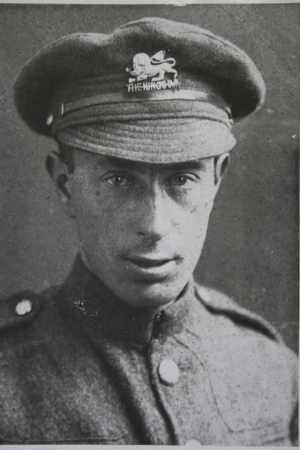
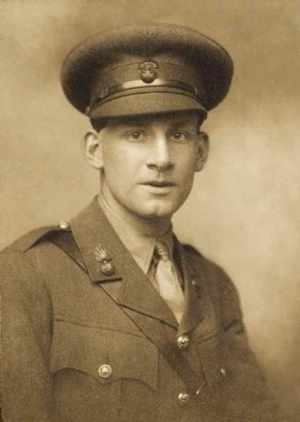
Isaac Rosenberg gives us this as well “Dead Man’s Dump” where he describes a dead men’s faces; “Burnt black by strange decay / Their sinister faces lie.” In “The Rear-Guard” Seigfried Sassoon also brings this up to us when he writes, “Terribly glaring up, whose eyes yet wore / Agony dying hard of ten days before; / And fists of fingers clutched a blackening wound.” 8 As the war went on and the fighting got more bitter and terrible, war poetry grew more and more interested in offering up the hardness of trench life, the reality of brutal warfare. And, unlike their letters, most war poetry was read among other soldiers instead of civilians, allowing a greater honesty and variety of topic. Poets, unlike journalists, are not held to keep the ‘public morale’ up and poetry was addressed to a general public instead of personal loved ones, making it easier for soldiers to discuss the moments they would not necessarily talk about in their letters.
Poetry fulfills the needs of the soldiers for other reasons as well. In Literature and the Great War 1914-1918, Stevenson says that part of poetry’s appeal to the soldiers and civilians of the Great War—the appeal that created a “hurricane of poetry” in both circles—was that “The war years . . . still lived and died—far more than later decades—under the sway of rhythmic forms of language.” Unlike fiction and drama, which were still not, at the time of the Great War, seen “as a form of high art,” poetry was a different beast altogether for the British public consciousness; it “continued to occupy a role in the literary sphere . . . [as] the genre most appropriate to serious emotion and the exalted stirrings of spirit and soul.”
For soldiers like Vera Brittain’s brother Edmund, “’Poetry counteracts the deadening influence [of the war] a good deal.'” It’s brevity and intensity were more well-suited to a war that hardly allowed for the writing of longer prose fiction—either in terms of carrying around a sheaf of papers or the bet that the author would live long enough to finish. Stevenson argues, “Poetry’s brief, concentrated visions were also ideally appropriate to the fragmentary yet powerful experiences the war often offered.” The structure of most war poetry—short, almost terse, and focused on single moments in time—supports this. Take, for instance, Gibson’s “Breakfast,” or Owen’s “The Sentry” which concentrate on a few brief moments of warfare; similarly Rosenberg, according to Stevenson, wrote his 70-line poem “Daughters of War” in bits and pieces whenever they were able to rest. 9
Finally, poetry, out of all the forms available, is the most adaptable. The modernist poets at the beginning of the century are proof enough of that, and evidence of their influence is visible in most war poetry. The flexibility of poetic form which can make and remake itself is necessary because of what Fussell talks about when he says that the Great War was “perhaps the last to be conceived as taking place within a seamless, purposeful ‘history’ involving a coherent stream of time running from the past through present to future.” 10 The Great War changes everything for the soldiers—it occurs, unlike World War II in a world that has not seen major war in decades, and introduces a number of new, traumatizing ways of warfare that significantly shift the psyche of the soldier. As they attempt to grapple with these intense changes, poetry is the only form available that can change with them—Owen’s poetic trajectory is a good example of this, as he begins his poetic career firmly in the Romantic trend and ends experimenting with form and theme to make it suit his purposes.
Poetry becomes a tool of choice for soldiers precisely because it is so flexible. Modernists changed poetry to suit them, stripping away or adapting traditional forms depending on how they want to portray a subject. War poets use poetry in a similar way; it is more intimate than photography, more honest than video, and infinitely more capable of portraying the brutality of the war that soldiers could not express in letters home or prose, which loses the heat and vivacity of language. War poetry allows these soldiers to send out their “harsh discordant cries” and is the best way for their experience and their trauma to be actualized in language.
Works Cited
- Owen, Wilfred. Collected Letters. Ed. Harold Owen and John Bell. London: Oxford UP, 1967. Print. ↩
- Stevenson, Randall. Literature and the Great War, 1914-1918. Oxford: Oxford UP, 2013. Web. ↩
- Boyce, George, James Curran, and Pauline Wingate. Newspaper History from the Seventeenth Century to the Present Day. London: Constable, 1978. Print. ↩
- Goldensohn, Lorrie. Dismantling Glory Twentieth-century Soldier Poetry. New York: Columbia UP, 2003. Print. ↩
- Fussell, Paul. The Great War and Modern Memory. New York: Oxford UP, 1975. Print. ↩
- Goldensohn, Lorrie. Dismantling Glory Twentieth-century Soldier Poetry. New York: Columbia UP, 2003. Print. ↩
- Walter, George. The Penguin Book of First World War Poetry. London: Penguin, 2006. Print. ↩
- Walter, George. The Penguin Book of First World War Poetry. London: Penguin, 2006. Print. ↩
- Stevenson, Randall. Literature and the Great War, 1914-1918. Oxford: Oxford UP, 2013. Web. ↩
- Fussell, Paul. The Great War and Modern Memory. New York: Oxford UP, 1975. Print. ↩
What do you think? Leave a comment.











My favorite poem is On Passing the New Menin Gate — partly because it was written in 1927, in retrospect, and attacks the (still ongoing) attempt to paint over a sordid crime with a veneer of heroism.
Dulce et Decorum Est… Studied it when I was about 12, still know every word.
More than 50 years ago, after our Latin class, in Washington, D.C., read the ode of Horace from which the title of the poem is taken, our teacher, Sylvia Gerber, said to the class, with wet eyes and deep emotion in her voice, “I cannot read this poem with you without also reading to you the following poem, by Wilfred Owen.”
For readers who don’t know the Owen poem, it describes a soldier’s horrific death in a gas attack, and ends by denouncing those who “tell to children, eager for some desperate glory, the old lie, dulce et decorum est pro patria mori.” The Latin means, “it is sweet and proper to die for one’s country.”
Agreed.
Gives a true insight to life on the frontline and resonated with me at school on a level that most poems failed to.
The World War I poems are amazing. But eventually you start to realise that you almost exclusively know work by British poets and maybe one or two others like Flanders Fields. All the poems by French, German etc poets really bring home the different perspectives and the horror of war from different angles and personalities.
No, you’re absolutely right. I wrote this originally focusing exclusively on British war-poets because they have the largest body of poetic work from the war, but there’s also French, German, and American soldiers writing as well – and doubtless more. The British poets tended to be the “voice” for the war-poets, but they were hardly the only experience that war-poets lived.
I adore almost anything by Paul Celan.
Celan, one of my absolute favourite poets… His poems so powerfully show the emotional and psychic damage and debris left by trauma and the events of war.
Excellent work. It’s intriguing to see the progression and transformation of point of views, such as Owens saying he was going to fulfill the vision of Keats (who interestingly enough was considered good for a military career as a child, but left surgeon training to become a poet), then going to write “Dulce et Decorum Est,” an ironic poem putting patriotism and honor up against the stark horrors of war. There’s definitely a lot of disillusionment in post-Great War, Modernist poetry.
I enjoyed reading how poetry is used as a platform for truth — more so than the news and multimedia of the time (and even in our present time). Poetry certainly serves as an outlet to express oneself more openly, which you’ve made clear in your writing with the great war poets. Fantastic work.
“Anthem for Doomed Youth”.
One of my personal favorites has always been The Man he Killed by Thomas Hardy, it captures perfectly that those who died in conflicts were just ordinary men much like the author.
Quite a well known one, but one that has always appealed to me.
I think Thomas Hardy’s poems about the war and also those of Edward Thomas are very moving – although neither of them deal with it directly. Hardy was old by this time, but was cynical and dismayed by the war. Edward Thomas fought and died in the war but seemed to approach the subject obliquely through his love of the countryside, and I find his work very poignant…eg ‘As the Team’s Head Brass’.
Here Dead We Lie by A E Housman
Here dead we lie
Because we did not choose
To live and shame the land
From which we sprung.
Life, to be sure,
Is nothing much to lose,
But young men think it is,
And we were young.
As one of the greatest war poems is by a Pole: Reality Demands by Wisława Szymborska
I completely agree with you. And when I watch the dreadful footage from Gaza her THE END AND THE BEGINNING comes immediately to mind.
Very good article if I may say so.
Great article! The first world war doesn’t nearly get the attention it deserves! Thank you!
Of course, originally it was written in Archaic Greek, but The Iliad is my favourite poem about war; especially Robert Fagles’ poetically sensitive translation.
A wonderful article. Poetry, in addition to providing a sense of comfort to soldiers in treacherous conditions of war, was also used as a major form of propaganda. In some ways, I find that poems used as propaganda, changed its meaning from what it actually meant to the soldiers themselves.
Good article! I like the idea that poetry provided an outlet that often helped avoid true censorship but also self-imposed censorship in an attempt to spare loved ones. I would be interested to see how much of poetry from the Great War was published purely in retrospect, and how far out for that matter, though written on the battlefield. Something for me to look into!
I recommend reading Paul Celan. “Death Fugue” for instance. Just google it.
here is an excerpt: “Black milk of morning we drink you at night
we drink you at noontime Death is a gang-boss aus Deutschland
we drink you at dusktime and dawntime we drink and drink
Death is a gang-boss aus Deutschland his eye is blue
he shoots you with leaden bullets his aim is true
there’s a man in this house your golden hair Margareta
he sets his dogs on our trail he gives us a grave in the sky
he cultivates snakes and he dreams Death is a gang-boss aus Deutschland “
Apart from real poetry written by real soldiers, Music has an influence on the experience of the post-war life equally as well as what was experienced during the given war. I believe that this generation uses the older wars as allegories to relative problems that our veterans now face. I am an avid listener to concept artists that imply such case to their music, and it has a profound affect on me. On exceptional band is Defeater. The story follows a WWI veteran and his life since the war, his shared travels with a boy who leaves a disheveled family and how his war stories implore a revitalization toward the boy’s predicament. The music in tandem with the lyrics give a reflective experience.
A good essay.
The Regeneration trilogy, by Pat Barker, explores a lot of these ideas. It’s an historical fiction work, incorporating both Sassoon and Owen into the story. I don’t know much about the two authors, so when I read Regeneration I couldn’t help but wonder how accurate her portrayal of them was.